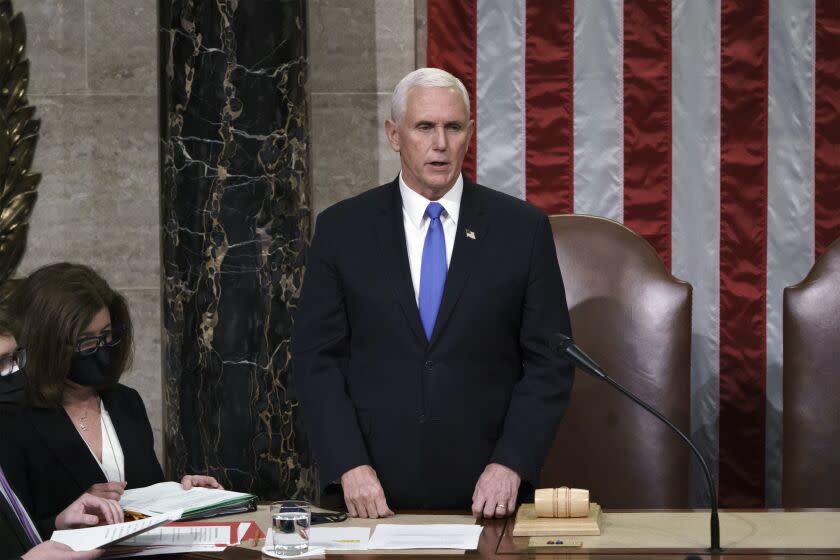Calmes: Congress is trying to stop its own members from another coup attempt

Call it the (spineless) Republicans’ lament: “The things we do for the orange Jesus.”
Those were the words muttered by one House Republican on Jan. 6, 2021, according to Rep. Liz Cheney, as he joined other Trump toadies in a party cloakroom to sign official objections to Joe Biden's electoral votes from key states. Those objections were just what then-President Trump and a growing mob outside the Capitol were demanding.
Cheney watched her colleague and thought, “You know, you’re taking an act that is unconstitutional." She recounted the episode Monday for an audience at the center-right American Enterprise Institute celebrating, fittingly, Constitution Day.
The MAGAmatons in Congress are still at it, of course, blindly following Trump’s wishes even as their orange Jesus lament speaks to the disdain that so many have for the 2020 loser.
On Wednesday — almost two years after they acquiesed or even colluded in Trump’s attempted coup and then ran for their lives — nearly all House Republicans voted against a bill intended to block another such insurrection after the 2024 election.
The measure passed, 229 to 203, in the Democratic-controlled House with the support of just nine Republicans including Cheney — all of them lame ducks, their congressional careers ended by party-primary defeats or decisions to retire in the face of MAGA voters’ anger at their failure to kowtow completely to Trump.
This bill is a BFD, as then-Vice President Biden famously said of other landmark legislation.
It would amend the 135-year-old Electoral Count Act, which Trump plotters misconstrued in a bid to let Congress overturn Biden’s victory. The changes would clarify what had been understood for more than a century, until Trump: A vice president (say, Mike Pence on Jan. 6, 2021) merely presides over Congress’ certification of states’ electoral votes; he or she has no power under the law or the 12th Amendment to change those votes.
Also, the House bill would raise the threshold number of lawmakers who must object to a state’s votes before Congress will consider the issue — from a single House and Senate member to one-third of each chamber. The bill would limit the grounds for objections. And a majority of the House and Senate would have to approve the objections.
Just two weeks ago, former federal Judge J. Michael Luttig, a prominent conservative advising members in the House and Senate on the issue, had all but given up on the bipartisan negotiations to fix the 1887 law. Then on Monday, Cheney and Democratic Rep. Zoe Lofgren of San Jose, both members of the select House committee investigating Jan. 6, 2021, introduced their bill.
For a non-emergency bill to be filed one day in the House and passed two days later is exceedingly rare. Yet as Luttig says, the need to change the Electoral Count Act is an emergency. Trump and his allies remain "a clear and present danger," Luttig told me. They “will seek again to overturn an election that doesn’t go their way.”
Cheney and Lofgren agree. They wrote this week in a Wall Street Journal op-ed that the continued lies from Trump and his followers — including Republican candidates for Congress and for state and local offices responsible for elections — raise “the prospect of another effort to steal a presidential election, perhaps with another attempt to corrupt Congress’s proceeding to tally electoral votes.”
News of their bill’s sudden House passage, and of improved prospects for a version in the Senate, has gotten little attention. After all, it’s hard to break through amid the latest bombshells about one alleged Trump transgression or another — financial fraud in New York real estate, the apparent theft of state secrets at Mar-a-Lago and his backers’ recorded tampering with voting equipment after the 2020 election.
On Thursday, sponsors of the separate Senate bill amending the Electoral Count Act secured their essential 10th Republican co-sponsor: Pennsylvania Sen. Patrick J. Toomey, who is retiring. With all 50 Democratic senators supporting the legislation, there are now the 60 votes necessary to avoid a Republican filibuster and pass the bill.
Even so, senators and House members must reconcile the differences in their respective bills. The Senate version is less strict, with looser grounds for objections to states’ electoral votes and fewer objectors required — one-fifth of each chamber instead of one-third. The aim is to negotiate final language in time for a vote in Congress’ lame-duck session, after the midterm elections in November.
“It would be an unexplainable and inexcusable disappointment to the country were Congress not to pass” some version of what’s on the table, Luttig said — to “ensure there would never be another Jan. 6.”
In these polarized times, there was a nice moment after the House vote when Speaker Nancy Pelosi (D-San Francisco) descended the dais and crossed the chamber’s well to where Cheney, now a pariah in her own party, had been chatting with Lofgren and several other Democrats. The liberal Pelosi warmly shook the very conservative Cheney’s hand.
Sadly, even assuming a happy ending for a revised Electoral Count Act, that’s not the takeaway from this legislative saga. Instead, what stands out is that Congress couldn’t get unanimity in either house on its attempts to rewrite a badly drafted 19th century law that was at the center of a bloody attack on the lawmakers’ own corridors and, potentially, their lives.
As Luttig said to me, “The Republican Party to this day will not go against Trump.”
That its members are so blinded by orange should have the rest of us seeing red.
This story originally appeared in Los Angeles Times.


